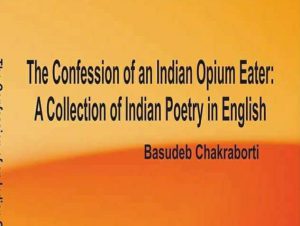Basudeb Chakraborti’s poems, on loneliness, offer mature insight into the psyche of the modern man. In his poem, ‘Love to be a Loner’, he declares: “A life of complete fulfilment I do not desire”, but he is also aware that if he wants to enjoy the space for tomorrow, he will have to transcend his ‘complacency’ and look for the intersection of joys and sorrows. Here’s the third part of the five-part series by Dr. Jernail and Prof. Manminder, exclusively for Different Truths.
Basudeb Chakraborti’s next set of poems, on loneliness, offer mature insight into the psyche of the modern man. In his poem, ‘Love to be a Loner’, he declares: “A life of complete fulfilment I do not desire” [p.9], but he is also aware that if he wants to enjoy the space for tomorrow, he will have to transcend his ‘complacency’ and look for the intersection of joys and sorrows. It is a brilliant idea and the image of ‘intersection’ is not only original but very graphic and leaves a permanent imprint on the mind:
“Is constant intersection between joy and sorrow
My opportunity to enjoy my space for tomorrow?” [p. 9]
‘We are not alone’ reminds us of Shelley whose oft-quoted lines come to mind:
“Nothing in the world is single,
All things by a law divine
In one another’s being mingle
Why not I with thine?”
The poet begins by saying: “In nature, nothing is single and alone”, restating Shelley’s faith, which he almost completes, with the next line: “The sky meets the land in the horizon”. However, the pairs that he conceives of are not the love pairs, but, being closer to reality of life, he conceives of the meeting of the river and the sea, joy and suffering, rise and fall, and he then concludes gallantly: “No reason to be alone in this limitless happiness” [p.10]. This idea invests the prism of life with mystical colours. While Shelley’s joy ends with his beloved, Dr. Basudeb Chakraborti extends his vision beyond these boundaries of sensual love and grazes in the unlimited pastures of imaginative elemental sympathy. The New Year is always all about hope, represented by the image of the sun peeping through the fog. From the New Year, the poet expects a better deal:
Shall we see the New with no animosity?
Shall the new dawn show no one hungry?
Shall we see everyone’s eyes with no tears?
Shall the world greet us with all its cheers?
[The Sun Peeps through the Fog, p. 13]
Love with nature comes very naturally to poets of love. However, playing with nature is fraught with dangers. Looking at the modern civilisation in Odisha, the poet comments that nature has been trimmed to suit man’s tastes and appears like a ‘caged bird’. However, taming nature and trimming it, has its saddening consequences also, because nature is not always benign. Sometimes, it loses its calm. ‘Our Love of Nature’ too brings out the same idea: that nature is vagrant also, under its obvious calm:
Man is gullible, we love nature beautiful,
But beneath its veneer, nature is dreadful. [p.15]
In all, the poet looks at nature with wonder assimilating its creative and decreative roles.
Dr. Chakraborti’s poetry on Love is invested with great admiration for this natural instinct which is central to human relations and relationships. However, the greatest threat to love in matrimony is King Size Ego:
And this King size ego is our intuitive vanity
And God creates us with his planned malignity.
The poet feels that in love, it is the beloved who is the real whole of man. He finds himself incomplete without her and what is she? I wonder if one can make any idea of her beauty and personality because what his words describe is only a precept:
You are my beauty like the formless form
Of my aesthetic percept that conforms
To an image, I aspire for millennia.
With a yearning of owning, my agenda.
The ideal of beauty that the poet aspires for lives in his imagination only, but it is his vivid imagination that brings up emotions into play as if something real is happening in his life. That is why, in his poem ‘Is Love Transcendental?’, he is trying to find an answer to his existential queries:
We are in silent love transcendental,
Love sublimated, nor corporal, physical
Smelt embalmed air around her body’s aura
And wish this eternity in joyous trauma. [p22]
‘Man’s Search Eternal’ is an important poem, from which emerges his formulation of love being a unifying power like imagination which yokes together disparate elements into a divine blending. ‘My Salvation’ celebrates love and life. The poet welcomes all that life is:
Hail to my flesh and then love for beauty
Hail to my finite frailty and then flippancy
Hail to my lady’s cozy zone of creation
Hail to all that results in my rejuvenation.[p. 29]
“I welcome both beauty and the ugly” is the poet’s attitudinal stance on this world, which grants him equipoise of sorts and he can express an equal love for the joys of the flesh, as well as beyond. Yet he has an eerie feeling of the mysterious. Even an affair like love has its grey areas. “I realise not wherewith you lies my tie” [p. 30] yet he believes in “indivisible togetherness of body and soul” [p. 30]. Analysing his love further on, he makes a wonderful disclosure which is more in the nature of a self-revelation:
My love for you is the love, my sweetie,
Of the moth for the light in the Dewali,
Love for you is the longing for the Sunrise,
Wishing the evening Sun for in the sky for demise.
The idea of consummation in love too is not far away. ‘Time Stops Suddenly [p. 39-40] delivers a powerful message in inimitable style:
Love, affection, concern fear and oneness
All are dissolved into indivisible togetherness
The spell breaks with the daylight
But the moment lingers in my life flight.
The poet believes that life is a grand continuum which is composed of numberless moments. Poems like ‘The Kanchenjunga’ and “What Relationship is” philosophize on life. Such existential questions lend the poem a deep vertical mystical depth.
It is the craving of the flowers to grow into fruits;
It is the craving of the river to meet its end in the sea
It is craving of the beehives that attract bees.
[What Relationship Is p.36].
(To be continued)
©Dr. Jernail S. Anand and Prof. Manminder Singh Anand
Co-author: Prof. Manminder Singh Anand is Assistant Prof., Dept. of English, DAV College, Sector 10, Chandigarh. He has authored ten books and published in national and international journals. Rhetorical Expressions is one of his most remarkable books.
Manminder Singh Anand is Assistant Prof., Dept. of English, DAV College, Sector 10, Chandigarh. He has authored ten books and published in national and international journals. Rhetorical Expressions is one of his most remarkable books.
Photos from the Internet
#romance #love #nature #time #life #literature #philosophy #Critisim #Poems #DifferentTruths






 By
By

 By
By